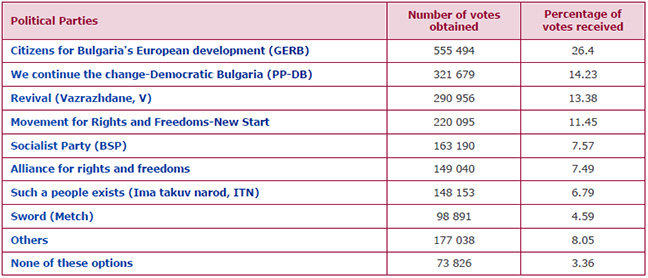Results
Elections in Europe
Corinne Deloy
-

Available versions :
EN

Corinne Deloy
On 27th October and for the seventh time since April 2021 and the second time this year, Bulgarians were called to the polls to elect the 240 members of the National Assembly (Narodno sabranie), the single chamber of Parliament. As expected, the balance of power was little changed by this new election.
The Citizens for the European Development of Bulgaria (GERB), led by former Prime minister (2009-2013, 2014-2017, 2017-2021) Boyko Borissov, won 26.4% of the vote. ‘We Continue the Change-Democratic Bulgaria' (PP-DB), a liberal coalition uniting the party chaired by Kiril Petkov with Democratic Bulgaria, which includes Yes Bulgaria, the Democrats for a Strong Bulgaria and which is led by Hristo Ivano, took second place with 14.23%, followed by Revival (Vazrazhdane, V), a nationalist party led by Kostadin Kostanidov, with 13.38%. ‘Revival's influence is growing to the point where the party is becoming a potential partner for GERB,’ said Dobromir Zhivkov, director of the Market Links opinion institute. However, Boyko Borissov has ruled out governing with Kostadin Kostanidov's party.
Supporters of Delyan Peevski, former co-leader of the Movement for Rights and Freedoms (DPS), representing the country's Turkish-speaking minority, who have joined forces with the Voice Party and the New Leaders Party to form the Movement for Rights and Freedoms-New Start, obtained a higher result than forecast by the opinion polls: 11.45% of the vote. The Socialist Party (BSP), led by Atanas Zafirov, took 7.57%. Three other parties will be represented in the Assembly: the Alliance for Rights and Freedoms, which brings together those close to Ahmed Dogan, former leader of the Movement for Rights and Freedoms (1990-2013), allied with the United Bulgarian Patriots (SBOR) and the National Agrarian Union, obtained 7.49% ; ‘Such a People Exist’ (Ima takuv narod, ITN), a populist party founded by singer and TV presenter Slavi Trifonov, obtained 6.79% and Metch (which means ‘sword’ in Bulgarian and is also the acronym for morality, unity and honour), which obtained 4.59%, thus surpassing the threshold of 4% of the vote required to be represented in parliament. The party was founded in October 2023 by a former member of Such a People Exists, the former Minister for Youth and Sport Radostin Vassilev. It claims to be the first genuinely pro-Bulgarian party in the country's contemporary history, and is in favour of an immediate halt to military aid to Ukraine and a policy of neutrality in the conflict between Kyiv and Moscow.
The turnout was around 38%, higher than the very low turnout recorded in the previous general elections on 9 June last (33.4%).
Results of the general elections of 27 October 2024 in Bulgaria
Turnout: 38%

Source: https://results.cik.bg/pe202410/rezultati/index.html
‘GERB's victory is undeniable,’ declared Boyko Borissov when the results were announced. ‘We have promised to form a government,’ he added, saying that he was ready to compromise and extend his hand to the other political forces. ‘People want a government, stability and security’.
Nevertheless, forming a majority government may prove difficult. GERB will have to find three partners to support it in parliament, which remains highly fragmented with eight parties represented. ‘Two parties will not be enough to form a government coalition. They will have to find another. The question is, which one could it be?’ asked Boryana Dimitrova, an analyst at the opinion institute Alpha Research.
'The responsibility of forming a government lies with GERB. We are waiting to see what they propose,’ said former prime minister (2023-2024) Nikolai Denkov (PP-DB).
During the election campaign, Kiril Petkov, leader of We Continue the Change and former Prime Minister (2021-2022), said that his party would not, under any circumstances, support a government with Boyko Borissov in it. He said that he wanted the first few weeks of parliament to be devoted to adopting rules for the election of a new anti-corruption commission and that measures should be taken to prevent the procedure for electing a new Prosecutor General by members of the Supreme Judicial Council whose term of office has expired.
‘We are now back in square one, waiting to see whether GERB and PP-DB will agree to isolate the far right,’ said Andrey Raichev, director of the National Centre of Public Opinion. ‘A fragmented parliament and long-standing political rivalries will complicate the formation of a stable and functional government (...) Prolonged political chaos could result in voters becoming increasingly disillusioned with traditional political parties in favour of populist, nationalist and pro-Russian formations,’ reads a publication by political risk consultant Teneo.
After seven general elections and five Prime ministers in four years, it would be a good thing if Bulgaria's electoral streak were to end sooner rather than later. According to an opinion poll conducted by Alpha Research, two-thirds of Bulgarians (61.60%) consider the country's political situation to be ‘extremely worrying’.
On the same theme
To go further
Elections in Europe
Corinne Deloy
—
15 April 2025
Elections in Europe
Corinne Deloy
—
25 February 2025
Elections in Europe
Corinne Deloy
—
18 February 2025
Elections in Europe
Corinne Deloy
—
28 January 2025

The Letter
Schuman
European news of the week
Unique in its genre, with its 200,000 subscribers and its editions in 6 languages (French, English, German, Spanish, Polish and Ukrainian), it has brought to you, for 15 years, a summary of European news, more needed now than ever
Versions :



